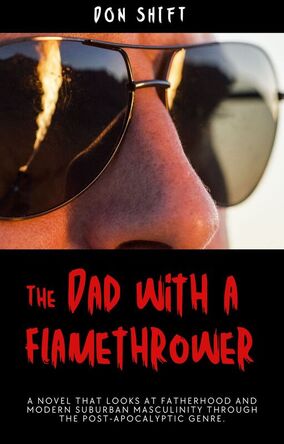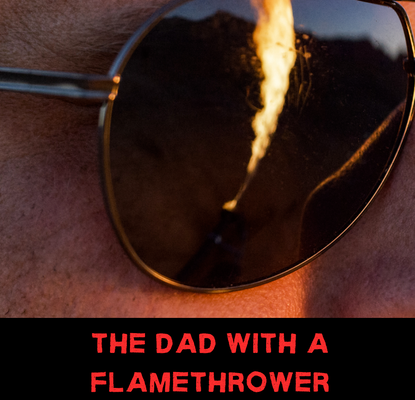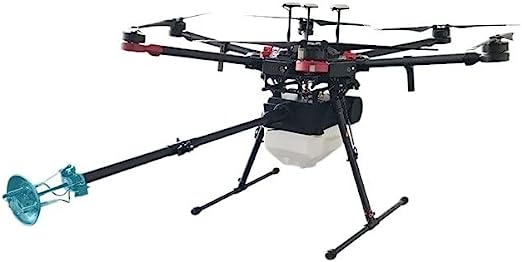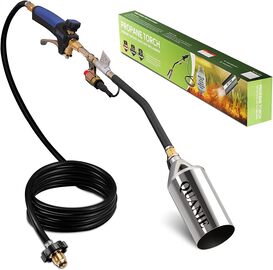The Dad With a Flamethrower

A suburban father is plunged into an icy heart of darkness that threatens his family and everything he holds dear. When a cataclysmic combination of a polar vortex, power grid failure, fuel shortage, and violent pre-election riots converges on his city, Ross’s complacent existence shatters into a deadly struggle for survival. To top it off, a communist revolution is being launched in his brother’s city, depriving the family of a place of refuge.
Ross, a software engineer turned executive, has always felt more comfortable behind a computer screen than dealing with the chaos of the outside world. But when the world starts spiraling towards chaos, the protective bubble around his suburban existence bursts, and his worst nightmares come to life. He finds himself frightfully underprepared and seemingly doing everything wrong.
The city descends into anarchy, the grocery stores are emptied, and the roads become battlegrounds. His refusal to heed his brother’s warnings about these high-impact, low probability events comes back to haunt him. A fateful encounter results in a self-defense shooting that marks him for death, with the perpetrator vowing to hunt him down.
As Ross battles the savage cold, the dwindling resources, and the dangerous predators lurking in the city, he must confront a chilling question: how far will he go to keep his family safe? As the violence escalates, Ross finds himself creating a homemade flamethrower, an act that symbolizes his transformation from a mild-mannered suburban dad to a fierce protector.
But when the floods come and they are forced to flee their home, Ross has to face his greatest challenge yet. Can he defend his family when the fugitive burglar comes to exact his revenge? Will his newfound tenacity and resourcefulness be enough to keep his family safe in a world gone mad?
This book is a thrilling exploration of fatherhood, suburban masculinity, and the depths of courage that emerge when everything is on the line. It is a harrowing tale of survival, transformation, and the enduring power of a father's love amidst the cold fury of a world falling apart. Can Ross, an unprepared everyman, rise to become the hero his family needs him to be? Or will he succumb to the overwhelming forces of nature and human savagery that threaten to consume him? The future of his family hangs in the balance, and every decision could mean the difference between life and death.
Ross, a software engineer turned executive, has always felt more comfortable behind a computer screen than dealing with the chaos of the outside world. But when the world starts spiraling towards chaos, the protective bubble around his suburban existence bursts, and his worst nightmares come to life. He finds himself frightfully underprepared and seemingly doing everything wrong.
The city descends into anarchy, the grocery stores are emptied, and the roads become battlegrounds. His refusal to heed his brother’s warnings about these high-impact, low probability events comes back to haunt him. A fateful encounter results in a self-defense shooting that marks him for death, with the perpetrator vowing to hunt him down.
As Ross battles the savage cold, the dwindling resources, and the dangerous predators lurking in the city, he must confront a chilling question: how far will he go to keep his family safe? As the violence escalates, Ross finds himself creating a homemade flamethrower, an act that symbolizes his transformation from a mild-mannered suburban dad to a fierce protector.
But when the floods come and they are forced to flee their home, Ross has to face his greatest challenge yet. Can he defend his family when the fugitive burglar comes to exact his revenge? Will his newfound tenacity and resourcefulness be enough to keep his family safe in a world gone mad?
This book is a thrilling exploration of fatherhood, suburban masculinity, and the depths of courage that emerge when everything is on the line. It is a harrowing tale of survival, transformation, and the enduring power of a father's love amidst the cold fury of a world falling apart. Can Ross, an unprepared everyman, rise to become the hero his family needs him to be? Or will he succumb to the overwhelming forces of nature and human savagery that threaten to consume him? The future of his family hangs in the balance, and every decision could mean the difference between life and death.
Excerpt from Chapter 1: Airport
Ross, you have really poor timing when it comes to vacationing, my inner voice chastised. Imagine the worst riots in US history occurring at the same time a massive polar vortex struck, causing a vicious freeze-then-flooding disaster a month before the most contentious election in American history. That’s what was waiting for us after we landed back home in the great western state of Fremont. All the bad stars aligned just right to cause a perfect storm of environmental and human conditions for a near-collapse scenario.
Man, it was cold. Florida’s 80° temps in early October were lovely but unfortunately the daytime high back here was only half that. You’d think being a hairy, slightly overweight middle aged white guy my genes would have been perfectly adapted for these far below-normal autumn temperatures. Nope. “This must be how Canadian tourists feel coming home,” I said as my family and I shivered in the cold on the airport sidewalk.
We had just deplaned after two weeks in Florida hitting the beaches and taking our girls to spend a week with The Mouse. We knew a cold weather anomaly had hit the southern midsection of the country, but this was a shock. No one expected to deplane into essentially martial law and a disaster zone. Normally one of the busiest airports in the country, River City International was eerily dead. The last time the taxi stands were this deserted was after 9/11.
“It feels like The Langoliers movie,” my wife Raelene said, referring to the Stephen King story where an airplane travels back in time to a yesterday devoid of all life. As in the story, the scene was unsettling, but not a supernatural kind of sinister. Real-life was probably more frightening.
Raelene and I had been married for seven years now. She was a traveling trauma nurse on an extended sabbatical and I was a software developer turned junior executive. We had a history of interesting vacation weather. Hurricane Emily made a guest appearance from afar not long after our wedding. Those rainy last two days of our honeymoon from the hurricane were charming compared to this.
“Daddy, I’m cold,” Reya, who was seven, said.
“Sorry, honey. Rub your arms.” It must have been in the high forties at sunset when it should have been 65°. Orlando was still having shorts weather so none of us had any jackets. I glanced at Remy, our two-year old, who wore her blanket like a cape.
“That’s the second Uber to cancel,” Raelene said. She looked up from her phone. “If we don’t get a cab, I’m unpacking her bag and getting her long sleeve shirt out.”
“Then let’s walk down to the next terminal.” A few cabs were parked over there. With the two kids in tow we barely made it to the sole minivan before a group of four businessmen did. “Where is everybody?” I asked the cab driver.
“Man, ain’t you been watching the news? Nobody wants to fly in here thanks to the Big Freeze and all the riots. This is Hurricane Katrina bad. Probably worse,” he mused.
We had been watching the news, particularly The Weather Channel, in the hotel because a tropical system was moving in on Florida. Since I was a techie, I was usually all over the Internet and on the bleeding-edge of the news, but not on vacation. My brother Grant let me know about riots in his medium-sized city of Red Rock in the rural north of the state—started by a police shooting of an out-of-towner—and we caught some coverage of what was being called “The Big Freeze” on CNN. What we were learning was that the media had been downplaying everything that was going on.
You may remember the storm-of-the-century cold snap Texas had not long ago. Fremont was experiencing something like that, but worse. This time the power grid did fail statewide. Powerplants were still trying to figure out their “black start” procedures while the national grid operators scrambled to send excess power in. We saw it all on the news, of course, but to us being so far away in Florida it was like it was happening in a different universe. My brother drove downstate and did some quick winterizing for us so we enjoyed ourselves knowing that everything would be fine by the time we got back.
However, like everything since COVID hit, this Big Freeze had second and third order effects no one anticipated. Since the entire region was affected, there was little help to send in from other states. Refineries shut down causing a gas shortage. Transportation delays led to stores, already emptied ahead of the freeze, meant that food wasn’t coming in. Since the election was less than a month away, that combined with racial tensions and some unfortunate police shootings pushed things over the top. Riots developed and these were way more than the violent pre-election protests that had been happening since summer.
Riots go with looting the way that destroyed mobile homes go with tornadoes. While there was plenty of opportunistic looting for pecuniary or material gain, much of it was focused on getting necessities. In the early days, hungry looters ignored places like Best Buy and went to supermarkets. One loaded cart running out the grocery store door served as a catalyst for many more to follow in a stampede. Closed restaurants were broken into for food. As the police’s ability to cope waned, the scope of the thefts changed from substance to the pillage of the free stuff army.
Looting was so bad that the National Guard was still deployed in a police capacity across the country. There was an armored vehicle sitting on top of the airport parking garage for crying out loud. It wasn’t just in River City, either. The entire Metro area of the state was dealing with the same thing and so were almost all the big cities across the county (minus the weather effects). The fractured politics of our nation had given us another riotous “summer of love” that threatened to spiral into a real civil war. Even my brother in the medium exurb of Red Rock City was embroiled in the unrest.
Red Rock, about two hours north, was pretty bad from what he told me. Refugees from the cold went up there from the cities and overwhelmed the locals. Looting and riots developed. Then Radical Community Reform, RadCom, activists (who had to change the official name because people started using it “negatively” and assuming that “com” referred to communism, which “seemed” bad to the official organizers) moved into inflame and exploit the situation. My brother called it a “literal communist revolution," which I thought was a bit extreme, but if terrorists were trying to blow up the regional powerplant—and they were—there could be a problem.
The reality here in River City was a lot different on the ground than the news depicted. I half anticipated the plane coming in high and fast to avoid gunfire and smoke from burning buildings when we landed. The streets looked quiet beneath us as we came in on final approach. Much of the snow was gone, too. The effects were subtle. The city was shrouded in an unsettling and deceptive tranquility, masking the severe distress beneath. The fallout so far seemed to be most of the airport concessions being shutdown and a lack of traffic
Man, it was cold. Florida’s 80° temps in early October were lovely but unfortunately the daytime high back here was only half that. You’d think being a hairy, slightly overweight middle aged white guy my genes would have been perfectly adapted for these far below-normal autumn temperatures. Nope. “This must be how Canadian tourists feel coming home,” I said as my family and I shivered in the cold on the airport sidewalk.
We had just deplaned after two weeks in Florida hitting the beaches and taking our girls to spend a week with The Mouse. We knew a cold weather anomaly had hit the southern midsection of the country, but this was a shock. No one expected to deplane into essentially martial law and a disaster zone. Normally one of the busiest airports in the country, River City International was eerily dead. The last time the taxi stands were this deserted was after 9/11.
“It feels like The Langoliers movie,” my wife Raelene said, referring to the Stephen King story where an airplane travels back in time to a yesterday devoid of all life. As in the story, the scene was unsettling, but not a supernatural kind of sinister. Real-life was probably more frightening.
Raelene and I had been married for seven years now. She was a traveling trauma nurse on an extended sabbatical and I was a software developer turned junior executive. We had a history of interesting vacation weather. Hurricane Emily made a guest appearance from afar not long after our wedding. Those rainy last two days of our honeymoon from the hurricane were charming compared to this.
“Daddy, I’m cold,” Reya, who was seven, said.
“Sorry, honey. Rub your arms.” It must have been in the high forties at sunset when it should have been 65°. Orlando was still having shorts weather so none of us had any jackets. I glanced at Remy, our two-year old, who wore her blanket like a cape.
“That’s the second Uber to cancel,” Raelene said. She looked up from her phone. “If we don’t get a cab, I’m unpacking her bag and getting her long sleeve shirt out.”
“Then let’s walk down to the next terminal.” A few cabs were parked over there. With the two kids in tow we barely made it to the sole minivan before a group of four businessmen did. “Where is everybody?” I asked the cab driver.
“Man, ain’t you been watching the news? Nobody wants to fly in here thanks to the Big Freeze and all the riots. This is Hurricane Katrina bad. Probably worse,” he mused.
We had been watching the news, particularly The Weather Channel, in the hotel because a tropical system was moving in on Florida. Since I was a techie, I was usually all over the Internet and on the bleeding-edge of the news, but not on vacation. My brother Grant let me know about riots in his medium-sized city of Red Rock in the rural north of the state—started by a police shooting of an out-of-towner—and we caught some coverage of what was being called “The Big Freeze” on CNN. What we were learning was that the media had been downplaying everything that was going on.
You may remember the storm-of-the-century cold snap Texas had not long ago. Fremont was experiencing something like that, but worse. This time the power grid did fail statewide. Powerplants were still trying to figure out their “black start” procedures while the national grid operators scrambled to send excess power in. We saw it all on the news, of course, but to us being so far away in Florida it was like it was happening in a different universe. My brother drove downstate and did some quick winterizing for us so we enjoyed ourselves knowing that everything would be fine by the time we got back.
However, like everything since COVID hit, this Big Freeze had second and third order effects no one anticipated. Since the entire region was affected, there was little help to send in from other states. Refineries shut down causing a gas shortage. Transportation delays led to stores, already emptied ahead of the freeze, meant that food wasn’t coming in. Since the election was less than a month away, that combined with racial tensions and some unfortunate police shootings pushed things over the top. Riots developed and these were way more than the violent pre-election protests that had been happening since summer.
Riots go with looting the way that destroyed mobile homes go with tornadoes. While there was plenty of opportunistic looting for pecuniary or material gain, much of it was focused on getting necessities. In the early days, hungry looters ignored places like Best Buy and went to supermarkets. One loaded cart running out the grocery store door served as a catalyst for many more to follow in a stampede. Closed restaurants were broken into for food. As the police’s ability to cope waned, the scope of the thefts changed from substance to the pillage of the free stuff army.
Looting was so bad that the National Guard was still deployed in a police capacity across the country. There was an armored vehicle sitting on top of the airport parking garage for crying out loud. It wasn’t just in River City, either. The entire Metro area of the state was dealing with the same thing and so were almost all the big cities across the county (minus the weather effects). The fractured politics of our nation had given us another riotous “summer of love” that threatened to spiral into a real civil war. Even my brother in the medium exurb of Red Rock City was embroiled in the unrest.
Red Rock, about two hours north, was pretty bad from what he told me. Refugees from the cold went up there from the cities and overwhelmed the locals. Looting and riots developed. Then Radical Community Reform, RadCom, activists (who had to change the official name because people started using it “negatively” and assuming that “com” referred to communism, which “seemed” bad to the official organizers) moved into inflame and exploit the situation. My brother called it a “literal communist revolution," which I thought was a bit extreme, but if terrorists were trying to blow up the regional powerplant—and they were—there could be a problem.
The reality here in River City was a lot different on the ground than the news depicted. I half anticipated the plane coming in high and fast to avoid gunfire and smoke from burning buildings when we landed. The streets looked quiet beneath us as we came in on final approach. Much of the snow was gone, too. The effects were subtle. The city was shrouded in an unsettling and deceptive tranquility, masking the severe distress beneath. The fallout so far seemed to be most of the airport concessions being shutdown and a lack of traffic


